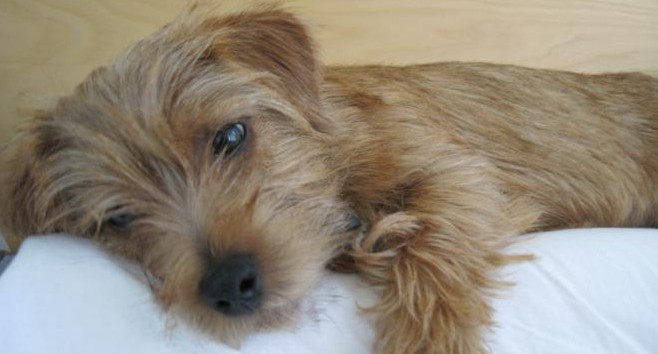
Pediatric dentistry is the field of dentistry dealing with our puppy and kitten patients. It is a fascinating field, and one that is far too often neglected. Several problems exist specific to growing puppies and kittens involving their deciduous teeth (baby teeth). Early intervention can often avoid problems later with the permanent teeth as they erupt.
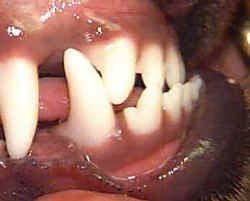 Malocclusion occurs when the teeth on the upper and lower jaws do not fit together properly. Sometimes the lower jaw may be too long for the upper jaw, or vice versa. This is a very common genetically driven characteristic that is often seen in small breed, squishy-faced dogs.
Malocclusion occurs when the teeth on the upper and lower jaws do not fit together properly. Sometimes the lower jaw may be too long for the upper jaw, or vice versa. This is a very common genetically driven characteristic that is often seen in small breed, squishy-faced dogs.
Malocclusion can result in abnormal tooth to tooth contact, where one tooth is abnormally banging against another. This causes eventual damage to both teeth. More often, abnormal tooth to gum contact occurs, where the teeth are causing inflammation and trauma of the gum of the opposing jaw. This is a painful condition that must be dealt with immediately.
If the deciduous (baby) teeth are causing these problems, they can be 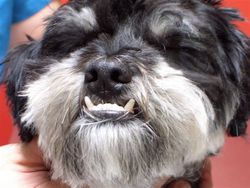 carefully extracted to eliminate the trauma. Sometimes (with luck), extraction of these teeth can help the shorter jaw “catch up” to the other as the puppy grows. When this happens, the adult teeth can then grow in a more normal position. The earlier this is done, the better the chance of success.
carefully extracted to eliminate the trauma. Sometimes (with luck), extraction of these teeth can help the shorter jaw “catch up” to the other as the puppy grows. When this happens, the adult teeth can then grow in a more normal position. The earlier this is done, the better the chance of success.
Despite our best efforts, sometimes the malocclusion does not correct itself, and the adult teeth begin to cause trauma as they erupt. Several different options exist to eliminate this problem, from extraction of the offending tooth, to procedures to shorten the teeth so they are no longer contacting the apposing teeth or gums.
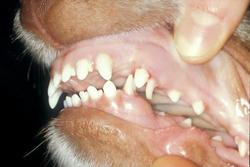 Another extremely common problem seen in our cats and dogs is retained deciduous (baby) teeth. Normally, the deciduous tooth falls out as its corresponding permanent (adult) tooth begins to poke through the gum. If this does not happen, the deciduous tooth may stay put, forcing the adult tooth to grow through the gum in an abnormal position, where it can cause trauma to other teeth and gums.
Another extremely common problem seen in our cats and dogs is retained deciduous (baby) teeth. Normally, the deciduous tooth falls out as its corresponding permanent (adult) tooth begins to poke through the gum. If this does not happen, the deciduous tooth may stay put, forcing the adult tooth to grow through the gum in an abnormal position, where it can cause trauma to other teeth and gums.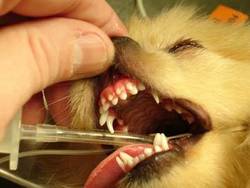
It is abnormal to have two of the same type of tooth in the mouth at the same time. If retained deciduous teeth are present, they must be extracted immediately, leaving room for the adult tooth to erupt in a normal position.
At Yorkville Animal Hospital, we routinely schedule a five month dental evaluation after a puppy or kitten’s final vaccination booster to evaluate the mouth for any of these potential problems. If problems are noted, then we may elect to have your pet spayed or neutered a tad early, in order to deal with these dental issues at the same time. If dental problems are noticed at an earlier stage in your pet’s growth, then they may safely be neutered or spayed earlier than five months as well, avoiding the need for a second anaesthetic at a later age.
